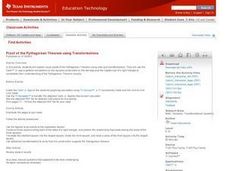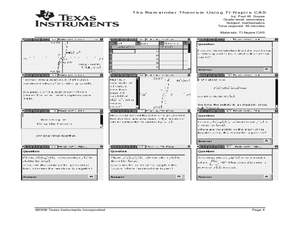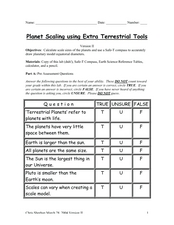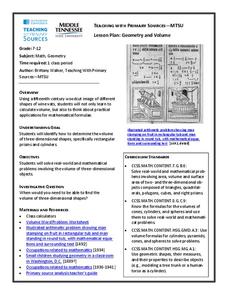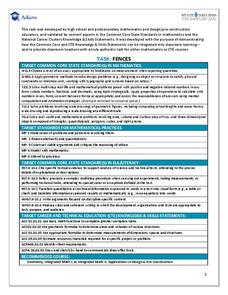EngageNY
Why Are Vectors Useful? 1
How do vectors help make problem solving more efficient? Math scholars use vectors to represent different phenomenon and calculate resultant vectors to answer questions. Problems vary from modeling airplane motion to the path of a robot.
Big Kid Science
Measuring Shadows Using an Ancient Method
How did ancient peoples determine the height of really tall objects? Young scientists and mathematicians explore the concept of using shadows to measure height in a hands-on experiment. Paired pupils measure shadows, then calculate the...
West Contra Costa Unified School District
Using Derivatives to Graph Polynomials
You can learn to graph as well as a calculator using calculus. The lesson introduces using derivatives to find critical points needed to graph polynomials. Pupils learn to find local maximums and minimums and intervals of increase and...
CK-12 Foundation
Adding and Subtracting Matrices: The Matrix Calculator
Discover the procedure to add and subtract matrices. Pupils use the interactive and discover the pattern in adding and subtracting matrices. Scholars adjust the entries in the addends and see the resulting changes in the sum. They also...
CK-12 Foundation
When to Use the Distributive Property: Rational Expressions
Discover how the distributive property applies to division. As learners change numeric values within an expression, the simulation calculates its value. Challenge questions lead individuals to realize the power of distributing the...
Curated OER
Using a Hundreds Chart
Youngsters participate in three activities using the hundreds chart. They will choose numbers to add up to one hundred. Whoever gets the most combinations wins. Two variations of the game are supplied.
Curated OER
Dance Challenge: Calculate and Compare Speed by Measuring a Series of Dance Movements
Really neat! Kids choreograph a dance phrase and then measure the distance and speed of the phrase using a timer and a meter stick. They collect the data on a table which they use to determine an average. A series of observation and...
Curated OER
Proof of the Pythagorean Theorem Using Transformations
Middle and high schoolers construct a triangle using Cabri Jr. They construct squares on each of the legs and hypotenuse of the triangle. Pupils show that the area of the squares on the leg equal the area of the square on the hypotenuse.
Curated OER
The Remainder Theorem Using TI-Nspire CAS
Investigate the Remainder Theorem in this algebra instructional activity. Explore the relationship between the remainders of polynomial division and the function. Each of the four problems gets progressively more complicated. This might...
Curated OER
Math in English Skills X Exercise Book
Provide your remedial math students with a handy packet that will help them practice prime factorization, exponents and roots, and multiplication and division of fractions. The packet includes 20 pages, bright images, and answer keys....
New York Science Teacher
Planet Scaling using Extra Terrestrial Tools
Your class will use a set scale to convert diameters of planets to the model size, the diagram given to expand on the number of planets drawn as concentric circles, and examine the scale that would be needed to fit the larger planets on...
Ahisma Summer Institute
The Power of One - Math in a Different Angle
In this 2-day instructional activity focused on exponents, middle schoolers will cross the curriculum by engaging in science, history and language arts activities. Exponential growth will be explored using grains of rice on a chess...
Curated OER
Math in English Skills VIII Exercise Book
For some learners, fractions are the bane of fifth- and sixth-grade existence. Use this fantastic packet to help those in remediation for mathematics. The packet contains 20 worksheets with answer keys, and covers adding, subtracting,...
Virginia Department of Education
Geometry and Volume
The history of math is fascinating! Utilize a woodcut primary source image from 1492 and posters from the 1930s to help geometers apply their volume-calculation skills to real-life questions.
EngageNY
Modeling Riverbeds with Polynomials (part 1)
Many things in life take the shape of a polynomial curve. Learners design a polynomial function to model a riverbed. Using different strategies, they find the flow rate through the river.
Illustrative Mathematics
How Thick Is a Soda Can I?
The humble soda can gets the geometric treatment in an activity that links math and science calculations. After a few basic assumptions are made and discussed, surface area calculations combine with density information to develop an...
Virginia Department of Education
Analyzing and Interpreting Statistics
Use measures of variance to compare and analyze data sets. Pupils match histograms of data sets to their respective statistical measures. They then use calculated statistics to further analyze groups of data and use the results to make...
Partnership for Educating Colorado Students
Mayan Mathematics and Architecture
Take young scholars on a trip through history with this unit on the mathematics and architecture of the Mayan civilization. Starting with a introduction to their base twenty number system and the symbols they used, this eight-lesson unit...
Curated OER
Sunrise, Sunset
What locations on Earth get the longest number of hours of daylight in the summer? Hint: It's not the equator! Use real-world sunrise and sunset data to develop trigonometric models that can be used to estimate the number of hours of...
EngageNY
Problem Solving Using Rates, Unit Rates, and Conversions
Find a way to work with rates. The 23rd part in a 29-part series presents work problems for the class to solve given work rates. Pupils compare rates to determine which is faster. Some problems require learners to convert the rates to...
EngageNY
Piecewise and Step Functions in Context
Looking for an application for step functions? This activity uses real data to examine piecewise step functions. Groups create a list of data from varying scenarios and create a model to use to make recommendations to increase revenue.
Yummy Math
US Holiday Candy Sales
Candy is a big business! Calculate the amount of money consumers spent on major holidays—Easter, Halloween, Christmas, Hanukkah, and Valentine's Day—based on the total amount of candy sales from 2011 and the percentage of each holiday's...
Benjamin Franklin High School
Saxon Math: Algebra 2 (Section 4)
This fourth of twelve units in a series continues the investigation of functions through equations and inequalities. However, the modular nature of the lessons in the section make this an excellent resource for any curriculum covering...
Achieve
Fences
Pupils design a fence for a backyard pool. Scholars develop a fence design based on given constraints, determine the amount of material they need, and calculate the cost of the project.









